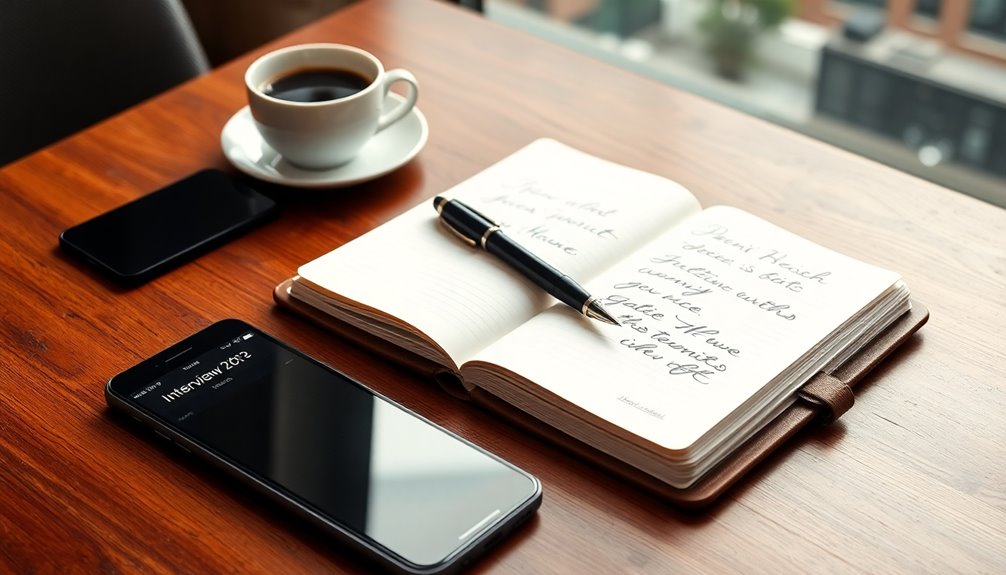To answer any question without breaking a sweat, start by understanding the question type and context. Break it down into simple parts, and practice structuring your responses clearly. Use everyday language, keeping your answers concise and organized. Incorporate effective questioning techniques, like open-ended questions, to engage your audience. Don't forget to manage anxiety with deep breathing and positive self-talk. Your delivery matters too; speak clearly and confidently. With these techniques, you'll find it easier to respond effortlessly. Keep going, and you'll uncover even more strategies to enhance your communication skills!
Key Takeaways
- Prepare thoroughly by researching common topics and potential questions to build confidence in your knowledge.
- Practice active listening to fully understand questions before responding, ensuring clarity in your answers.
- Use simple language and structure your responses logically to convey your message effectively.
- Employ deep breathing techniques to calm your mind and reduce anxiety during discussions or presentations.
- Engage with your audience by asking clarifying questions, creating a comfortable dialogue that encourages open communication.
Understanding the Question

How can you effectively understand a question before answering it? Start by identifying the type of question. Is it open-ended or closed-ended? This helps you tailor your response.
Next, determine if it's hypothetical, comparative, or solution-focused. This insight will guide the depth of your answer. Recognize the level of understanding the question is probing, whether it's recall, application, or evaluation.
If the question seems unclear, don't hesitate to seek clarification. Avoid making assumptions about its intent; instead, ask for specifics. If it contains multiple parts, break it down to guarantee you address each component thoroughly.
Context is vital, so consider where and why the question is being asked. Analyzing the purpose behind the question helps too. Is it aimed at fostering discussion or evaluating understanding? Understanding these objectives can shape how you respond. Additionally, effective questions can stimulate discussion and enhance your engagement with the audience.
Finally, anticipate possible responses. Think about common misconceptions or alternative viewpoints that may arise. This preparation allows you to adapt your answer based on your audience's reaction, making your response more effective and relevant.
Structuring Your Answer

When structuring your answer, focus on using direct response techniques that clearly address the question. Keep your language simple and straightforward to enhance understanding and engagement. This approach not only makes your response more effective but also demonstrates your ability to communicate clearly. Additionally, incorporating visual appeal in presentations can further enhance the clarity and retention of your message. Understanding your audience's investment goals can also tailor your answers to their specific needs and concerns.
Direct Response Techniques
Structuring your answer is essential for effective direct response techniques, as it helps grab attention and keeps your audience engaged.
Start by identifying your target audience, ensuring you understand their needs and desires. This knowledge allows you to craft compelling offers that speak directly to them. Use clear, concise language to describe your offer, highlighting its unique features and benefits. Consider using retirement savings plans to illustrate how your offer can enhance financial security for your audience.
Incorporate strong calls to action (CTAs) to guide your audience on what to do next. Phrases like "limited time only" or "only a few items left" create urgency, invoking a sense of FOMO. Consider using countdown timers or specifying an end date for the offer to enhance this urgency further.
Combine urgency with exclusive offers to maximize effectiveness while ensuring these tactics remain genuine to maintain trust. Effective campaigns necessitate well-crafted offers and targeted strategies to resonate with your audience.
Clearly explain your value proposition, focusing on how your product or service solves the customer's problem or improves their situation. Use bullet points to list key benefits, making it easy for your audience to scan. This structured approach not only keeps your answer organized but also drives your audience to take action, ultimately leading to better engagement and conversion rates.
Clarity Through Simplicity
A clear and simple approach to answering questions can greatly enhance understanding and engagement. When you communicate, aim to use everyday language—avoid jargon unless absolutely necessary. Stick to words you'd use in a casual conversation, ensuring your message is easy to grasp. Reading your content aloud can help you assess its clarity and flow.
Keep your sentences short. Each should focus on one main idea to avoid overwhelming your audience. Remove unnecessary details that don't contribute to your main point. This keeps your message concise and impactful. Additionally, using short sentences can significantly improve readability.
Structure your answers logically. Organize your thoughts into sections with clear headings, and use bullet points to break down complex information. This makes it easier for others to scan and digest your content.
Lastly, adopt a human tone. Write as if you're having a conversation, which makes your message more relatable. Show your passion and knowledge without overcomplicating things. Your goal should be to convey your ideas simply and effectively, making your content accessible and memorable for everyone.
Effective Questioning Techniques

Mastering effective questioning techniques can greatly enhance your communication skills, whether in personal conversations, professional settings, or educational environments. By using the right types of questions, you can gather valuable information, clarify ambiguity, and engage more deeply with your audience. One effective approach is to start with open questions to invite thoughtful responses, which can create a comfortable space for conversation. Additionally, practicing the Law of Attraction can help you cultivate a positive mindset that enhances your interactions.
Here's a quick overview of different types of questions:
| Question Type | Purpose | Example |
|---|---|---|
| Open Questions | Gather detailed insights | "What happened in the sales meeting?" |
| Closed Questions | Seek simple, direct answers | "Did you receive a response from Jill?" |
| Probing Questions | Extract specific details | "Why do you think sales have declined?" |
When you start with open-ended questions, you create a comfortable space for conversation. Then, you can use closed questions to confirm details and probing questions to dive deeper. Remember to avoid loaded questions that may lead to biased responses. By using these techniques, you'll improve not only your questioning skills but also your overall communication effectiveness.
Engaging With Your Audience

Engaging with your audience is fundamental to effective communication and can greatly enhance the impact of your interactions. To foster real-time engagement, consider hosting live streams and webinars where your audience can participate actively. Incorporate interactive polls and discussions to create a dynamic experience that keeps everyone involved. Additionally, remember that celebrity worship can influence audience engagement, as people often connect more deeply with familiar figures.
Gamification techniques, like quizzes and contests, can also make your content more enjoyable. For a unique twist, explore virtual reality (VR) and augmented reality (AR) to captivate your audience's attention.
On social media, find out where your audience hangs out and join those conversations organically. Respond to comments and encourage sharing to build a vibrant community. Curate user-generated content to spark meaningful dialogue and use platforms like YouTube, LinkedIn, and Instagram for real-time engagement.
Don't forget the power of visuals! Incorporating images and videos can make your content more appealing and help convey information quickly. Engaged audiences are more likely to share positive experiences, which enhances your brand reputation.
Show your authentic side by aligning with your brand values and using visuals that resonate with your audience. By actively engaging them, you'll create a more impactful communication experience that leaves a lasting impression.
Enhancing Your Delivery

To enhance your delivery, focus on speaking clearly and at a measured pace. This helps your audience absorb your message while keeping their attention. Engaging gestures can also elevate your presentation, making your points more memorable and impactful. Additionally, incorporating body language that reflects confidence will further strengthen your connection with the audience. Consider utilizing vertical monitors to optimize your display during presentations, as they enhance visibility for long documents and reduce eye strain.
Speak Clearly and Slowly
When you speak clearly and slowly, you not only enhance your delivery but also guarantee that your message resonates with your audience. Speaking at a measured pace allows your words to be understood, ensuring that important details aren't lost. It shows respect for your listeners, demonstrating that you value their attention and want them to grasp your message fully.
To improve your slow speech, start with conscious breathing. Deep breaths calm your body and slow down your mind. Make intentional pauses between sentences to give your audience time to process what you've said. Research indicates that a slower speech rate enhances listener comprehension, making it easier for them to retain the information you share.
Focus on enunciation; pronouncing each word clearly will naturally slow your speech and enhance clarity. You can also record yourself practicing to identify areas where you might rush. Role-playing or joining a public speaking group can provide a supportive environment to hone your skills.
Remember to embrace silence strategically, using it to build anticipation and emphasize key points. Lastly, stay hydrated and manage your time effectively to avoid feeling rushed.
Use Engaging Gestures
Using effective hand gestures can greatly enhance your delivery and make your message more memorable. When you emphasize key points with your hands, it reinforces your message. Use listing gestures, like counting on your fingers, to help your audience follow along as you enumerate your ideas. Extend your hands to illustrate concepts, adding dynamism to your presentation. Additionally, maintaining a calm demeanor while gesturing can help foster a peaceful environment for your audience, akin to a Montessori-inspired setup.
Engage your audience by prompting them with gestures, like raising your hand when asking them to do the same. Mirror their actions to encourage participation and maintain a connection through eye contact while you gesture. Keep your body language open; avoid crossed arms, which can make you seem unapproachable. Instead, maintain a relaxed posture with your arms at your sides or your hands in your pockets when not gesturing.
Practicing your gestures is crucial, as expressive gestures significantly enhance audience impact, ensuring your message resonates. Practice integrating gestures with your speech to guarantee a natural flow. Avoid using the hand holding your notes to gesture, as it can distract from your message. Instead, switch hands if necessary. Understanding the psychology behind how gestures affect communication can help you refine your delivery further.
Practicing and Preparing

- Brainstorm Questions: Write down potential questions in advance. Think about various outcomes and how they might influence the conversation. Additionally, consider utilizing platforms that facilitate freelance opportunities for gathering insights.
- Align with Objectives: Make sure your questions align with the goals of the meeting or discussion. This keeps the conversation focused and purposeful.
- Sequence Questions: Organize your questions from simple to complex. This helps guide the discussion and makes it easier for the respondent to follow. Additionally, utilizing a range of question types, such as open-ended questions, can foster a more engaging dialogue.
- Review and Adjust: After drafting your questions, review them. Be ready to adjust based on the flow of conversation or feedback you receive.
Overcoming Anxiety and Stress

Anxiety and stress can feel overwhelming at times, but there are effective strategies to help you regain control. Start with deep breathing: inhale for four seconds, hold for seven, and exhale for eight. This simple technique calms your mind and body. Engaging in continuous learning can also be beneficial, as it empowers you to adapt to new situations and reduce anxiety.
You might also try progressive muscle relaxation, where you tense and then release different muscle groups to achieve relaxation. Incorporating physical activity into your routine can work wonders too. A short walk around the block or practicing yoga can help clear your mind and relieve tension. Quick walks can also improve concentration and mental clarity.
Activities like tai chi or jogging not only distract from racing thoughts but also boost your mood. Make environmental adjustments to enhance your well-being. Spend time outside in the sunlight, listen to uplifting music, or enjoy a soothing foot massage.
Additionally, sipping green tea can help lower stress levels. Finally, focus on mental strategies. Positive self-talk, counting backward, and effective time management can shift your mindset. Don't forget the power of laughter and social interactions—spending time with friends or pets can lift your spirits and reduce anxiety.
Embrace these techniques to manage stress and approach any situation with confidence.
Frequently Asked Questions
How Do I Handle Unexpected or Tricky Questions?
When you face unexpected or tricky questions, take a moment to pause and breathe. This helps you gather your thoughts.
If the question's unclear, ask for clarification. Break it down into smaller parts to tackle it more easily.
Use examples from your experience to illustrate your points. Stay calm and maintain your confidence throughout.
What if I Don't Know the Answer?
Imagine you're traversing a dense forest, unsure of the path ahead. When you hit a question you can't answer, it's okay. Acknowledge the question's importance, and take a moment to breathe.
Repeat it to clarify, then pause to gather your thoughts. If you need time, say you'll find the answer later. Stay honest; it's better to admit uncertainty than to guess.
Reinforce your main points to keep the audience engaged.
How Can I Improve My Public Speaking Skills?
To improve your public speaking skills, start by preparing thoroughly. Outline your key messages and practice your speech multiple times.
Record yourself to refine your body language and delivery. Join groups like Toastmasters for feedback and support.
Focus on mastering your posture, eye contact, and tone while engaging your audience with relatable stories or humor.
What Techniques Help Reduce Anxiety Before Speaking?
Did you know that about 75% of people experience anxiety before public speaking? To reduce this anxiety, try deep breathing techniques to calm your body, or practice mindful meditation to enhance focus.
Engaging in a pre-speech routine can also signal calmness. Visualizing success helps build confidence, and grounding techniques, like holding a stable object, can anchor you.
Remember to embrace your anxiety as excitement, transforming fear into energy for your presentation.
How Do I Tailor My Response to Different Audiences?
To tailor your response to different audiences, start by understanding their demographics and cultural backgrounds.
Use surveys or interviews to gather insights, then create detailed buyer personas.
Adjust your communication style by using relevant language and examples that resonate with them.
Keep your content straightforward and avoid jargon.
Finally, choose the right channels for delivery and seek feedback to guarantee your message hits home effectively.
Conclusion
In the dance of conversation, you've now got the steps to glide effortlessly through any question. By understanding, structuring, and engaging, you'll transform anxiety into confidence, like a butterfly emerging from its cocoon. Embrace practice as your ally, and let your voice be the melody that resonates with your audience. Remember, each question is a chance to shine, so step onto the stage with courage and let your brilliance light up the room!









